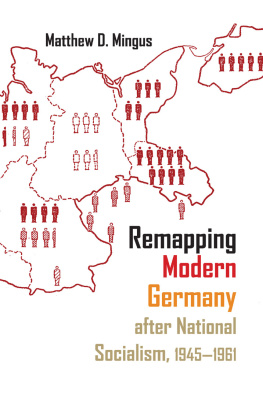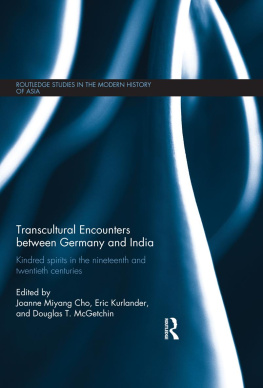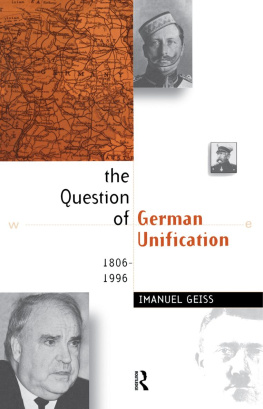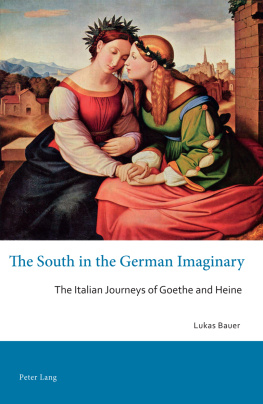Table of Contents
Guide
Page List
Matthew D. Mingus is assistant professor of history at the University of New Mexico at Gallup. He loves living in New Mexico and spending time with his wife, Lindsey, their son, Isaac, and their dogs, Dixie and Oakley. When Professor Mingus is not busy teaching, he brews beer, plays board games, and hikes.
Acknowledgments
This book would have been an impossible project without the very generous support of several institutions and individuals. My editors at Syracuse University Press, Alison Shay and Kelly Balenske, helped push the manuscript forward, answered all of my (many) questions, and made the revisions process a generally pleasant experience. Don Mitchell and the other series advisers for the press as well as two anonymous peer reviewers offered invaluable criticism that made this work stronger and, I think, more convincing. Annie Barva did an incredibly thorough job of copyediting this book. I am grateful for her extraordinary patience. The University of Florida, the University of New Mexico at Gallup, the Georg Eckert Institute, the Leibniz-Institut fr Lnderkunde, and the American Geographical Society Library provided financial support. The staff and faculty of these institutionsand of every library, archive, and society cited throughout this manuscriptwork tirelessly to make their material accessible to the public (and, by extension, to me). In our contemporary political climate, mired in a myopic and fanatical obsession with the excesses of big government, I hope that this book speaks to the value of the librarians, faculty, bureaucrats, historians, and archivists charged with maintaining and preserving our historical commons.
Intellectually, I owe this project to my mentors, teachers, and colleagues. Peter Bergmann, Alice Freifeld, and Sheryl Kroen guided and influenced every page. My friend and adviser Geoffrey Giles carefully and brilliantly helped me craft a jumbled mess of ideas into what I hope is now a fair reflection of his effectiveness as both a scholar and a teacher. Geoffrey Martin continually encouraged my research and provided me with advice and lively conversation. My fellow faculty at the University of New Mexico at Gallup have been instrumental in keeping me sane while I tackled this book alongside a seemingly inhuman fifteen-credit-hour teaching load each semester: Stephen Buggie, Bruce Gjeltema, Ken Roberts, Jim Sayers, Kristian Simcox, Kristi Wilson, and John Zimmerman supported me in my teaching, in my research, and in friendship. Carolyn Kuchera, in particular, donated her time and energy to reading and commenting on various parts of this manuscript. Raymond Calderon, Kyle Chancellor, Whitney Conroy, my brother, Aaron Mingus, Richard Reyes (who I hope enjoys all the serial commas!), and Lane and Toni Towery provided many necessary, off-campus distractions. They all have helped make Gallup, New Mexico, my home.
Of course, my source of greatest support has been my family. My in-laws, Tom and Kelly Smith, and my parents, Marty and Becky Mingus, never seemed to doubt that this book would become a reality. I am most indebted, though, to my best friend and partner, Lindsey Smith-Mingus. She supported me through graduate school, moved multiple times for my career, tolerated my extensive research travel, and continues to listen patiently to my occasional wild ranting. She is a phenomenal teacher and the worlds best mother, and she has a fantastic laugh. I have never loved anyone more. It is to her and to our new son, Isaac, that I dedicate this book.
Bibliography
Archives
American Association of Geographers, Univ. of Wisconsin, Milwaukee.
American Geographical Society Library, Univ. of Wisconsin, Milwaukee.
Bundesarchiv, Koblenz, Germany.
Leibniz-Institut fr Lnderkunde, Archiv fr Geographie, Leipzig, Germany.
Martin, Geoffrey. Personal archive, New Haven, CT.
National Archives and Records Administration, Washington, DC.
National Archives of the United Kingdom, London.
University of Florida Library and Archive, Gainesville.
University of Nebraska Library and Archive, Lincoln.
Published Sources
Ahonen, Pertti. The Curious Case of Wener Weinhold: Escape, Death, and Contested Legitimacy at the GermanGerman Border. Central European History 45, no. 1 (2012): 79101.
______. Death at the Berlin Wall. New York: Oxford Univ. Press, 2011.
Anderson, Benedict. Imagined Communities: Reflections on the Origin and Spread of Nationalism. 1983. Rev. ed. New York: Verso, 2006.
Annenkov, V. V. International Geographic Congresses. In The Great Soviet Encyclopedia, 71516. New York: Macmillan, 197383.
Bachmann, Veit. From Jackboots to Birkenstocks: The Civilianisation of German Geopolitics in the Twentieth Century. Tijdschrift voor Economische en Sociale Geografie 101, no. 3 (2009): 32032.
Banta, Frank G. A Role in the Education Branch of the Office of the Military Government for Germany (US), 19451949. In Hochschuloffiziere und Wiederaufbau des Hochschulwesens in Westdeutschland, 19451952, vol. 2: Die US-Zone, edited by Manfred Heinemann and Ullrich Schneider, 3542. Hannover: Verffentlichung aus dem Forschungsschwerpunkt Zeitgeschichte von Bildung und Wissenschaft der Universitt Hannover, 1990.
Barnes, Trevor J. Geographical Intelligence: American Geographers and Research and Analysis in the Office of Strategic Services, 19411945. Journal of Historical Geography 32, no. 1 (2006): 14968.
Barten, Heinrich, ed. Lnder und Vlker Erdkundliches Unterrichtswerk. Vol. 5: Deutschland, die Mitte Europas. Stuttgart: Ernst Klett, 1951.
______, ed. Lnder und Vlker Erdkundliches Unterrichtswerk. Vol. 5: Deutschland, die Mitte Europas. Stuttgart: Ernst Klett, 1954.
______, ed. Lnder und Vlker Erdkundliches Unterrichtswerk. Vol. 5: Deutschland, die Mitte Europas. Stuttgart: Ernst Klett, 1956.
Becker, Hellmut. Retrospective View from the German Side. In The British in Germany: Education Reconstruction after 1945, edited by Arthur Hearnden, 26882. London: Hamish Hamilton, 1978.
Benjamin, Walter. The Arcades Project. Translated by Howard Eiland and Kevin McLaughlin. Cambridge, MA: Belknap Press of Harvard Univ. Press, 1999.
Berdahl, Daphne. Where the World Ended: Re-unification and Identity in the German Borderland. Berkeley: Univ. of California Press, 1999.
Bernays, Edward. Propaganda. 1928. Reprint. New York: Ig, 2004.
______. Public Relations. Norman: Univ. of Oklahoma Press, 1952.
______. Speak Up for Democracy! What You Can Doa Practical Plan of Action for Every American Citizen. New York: Viking Press, 1940.
Bird, Geoffrey. The Universities. In The British in Germany: Educational Reconstruction after 1945, edited by Arthur Hearnden, 14657. London: Hamish Hamilton, 1978.
Black, Lloyd D. Further Notes on German Geography. Geographical Review 37, no. 1 (1947): 14748.
Blackbourn, David. History of Germany, 17801918: The Long Nineteenth Century. 2nd ed. Malden, MA: Blackwell, 2003.
Blackbourn, David, and Geoff Eley. The Peculiarities of German History: Bourgeois Society and Politics in Nineteenth-Century Germany. New York: Oxford Univ. Press, 1984.
Boehling, Rebecca. The Role of Culture in American Relations with Europe: The Case of the United States Occupation of Germany. Diplomatic History 23, no. 1 (1999): 5769.
Braunreuther, Kurt. ber die Bedeutung der Physiokratischen Bewegung in Deutschland in der Zweiten Hlfte des 18. Jahrhunderts. Wissenschaftliche Zeitschrift der Humboldt-Universitt zu Berlin 5, no. 1 (1955): 1565.
Breuilly, John. The German National Question and 1848.










